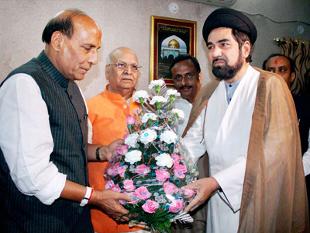New Delhi, Feb 23: Hailing the role of first Prime Minister Jawaharlal Nehru in shaping India a modern nation state, former Prime Minister Manmohan Singh on Saturday hit out at the Narendra Modi-led Central government, saying "nationalism" and the slogan of 'Bharat Mata Ki Jai' are being misused to construct a militant and purely emotional idea of India.
Speaking at the launch of a book on Jawaharlal Nehru's works and speeches, Singh said: "I am extremely happy that this book makes an effort to revisit Pandit Nehru. He had led this country in its volatile, formative days when we adopted democratic way of life, accommodating divergent social and political views."
The former Prime Minister said that Nehru, who was very proud of Indian heritage, "assimilated it", and harmonised them into the needs of a "new modern" India.
"A great visionary, Nehruji laid the foundation for shaping India as a modern nation state," he said.
Highlighting the works of the first Prime Minister, Singh said: "If India is recognized in the comity of nations as a vibrant democracy and, if it is considered as one of the important world powers, it was Nehru, who should be recognised as its main architect."
He said Nehru was not only a statesman of high international standing, but a great historian and literary figure too.
"With an inimitable style, and a multi-linguist, Nehru laid the foundation of the universities, academies and cultural institutions of Modern India. But for Nehru's leadership, Independent India would not have become what it is today," he said.
Taking an apparent dig at the BJP government, he said: "But unfortunately, a section of people who either do not have the patience to read history or would like to be deliberately guided by their prejudices, try their best to picture Nehru in a false light.
"But I am sure, history has a capacity to reject fake and false insinuations and put everything in proper perspective," he said.
He said the book "Who is Bharat Mata" is such an attempt to set the narrative in the right direction.
Singh said that selecting appropriate pieces from Nehruji's works, the book justifies its title "Who is Bharat Mata?"
"As this book contains a timely collection of writings by and on Pandit Jawaharlal Nehru- the leader, who shaped India and the Icon whose legacy is the subject of intense and often angry reaction today.
The book also comprises reminiscences and assessments of Nehru by some of his contemporaries and near contemporaries-among them, including Mahatma Gandhi, Bhagat Singh, Sardar Patel, Maulana Azad, Aruna Asaf Ali, Sheikh Abdullah, Ramdhari Singh Dinkar, Ali Sardar Jafri, Baldev Singh, Martin Luther King Jr, Richard Attenborough, Lee Kuan Yew and Atal Bihari Vajpayee.
"It is a book of particular relevance at a time when nationalism and the slogan of ‘Bharat Mata Ki Jai' are being misused to construct a militant and purely emotional idea of India that excludes millions of residents and citizens," Singh said attacking the BJP government.
The two time Prime Minister further said that in the pages of the carefully complied anthology-which also carries illuminating introductions by the authors Nehru emerges as a "remarkable man of ideas and action", who had an instinctive understanding of India's civilisational spirit and as a visionary with clear commitment to the promotion of scientific temper, who despite the compulsions of politics, remained a true democrat.
"His legacy continues to be of immense significance-perhaps more today than at any other time in our history," he said.
He also warned that "Nehru makes a very significant and time relevant remark on the dangers of leaderships falling into a trap and getting removed far away from the common people whom they are supposed to serve".
"In an atmosphere, when emotions are deliberately get provoked and the gullible are misled by false propaganda, misusing communication technology, this book makes a refreshing break through," Singh added.
 New Delhi, Apr 16: Congress and BJP on Tuesday sparred over Rajnath Singh's meeting with Muslim clerics in Lucknow with the ruling party accusing BJP of "double-speak" and the opposition party hitting back.
New Delhi, Apr 16: Congress and BJP on Tuesday sparred over Rajnath Singh's meeting with Muslim clerics in Lucknow with the ruling party accusing BJP of "double-speak" and the opposition party hitting back.





Comments
Add new comment